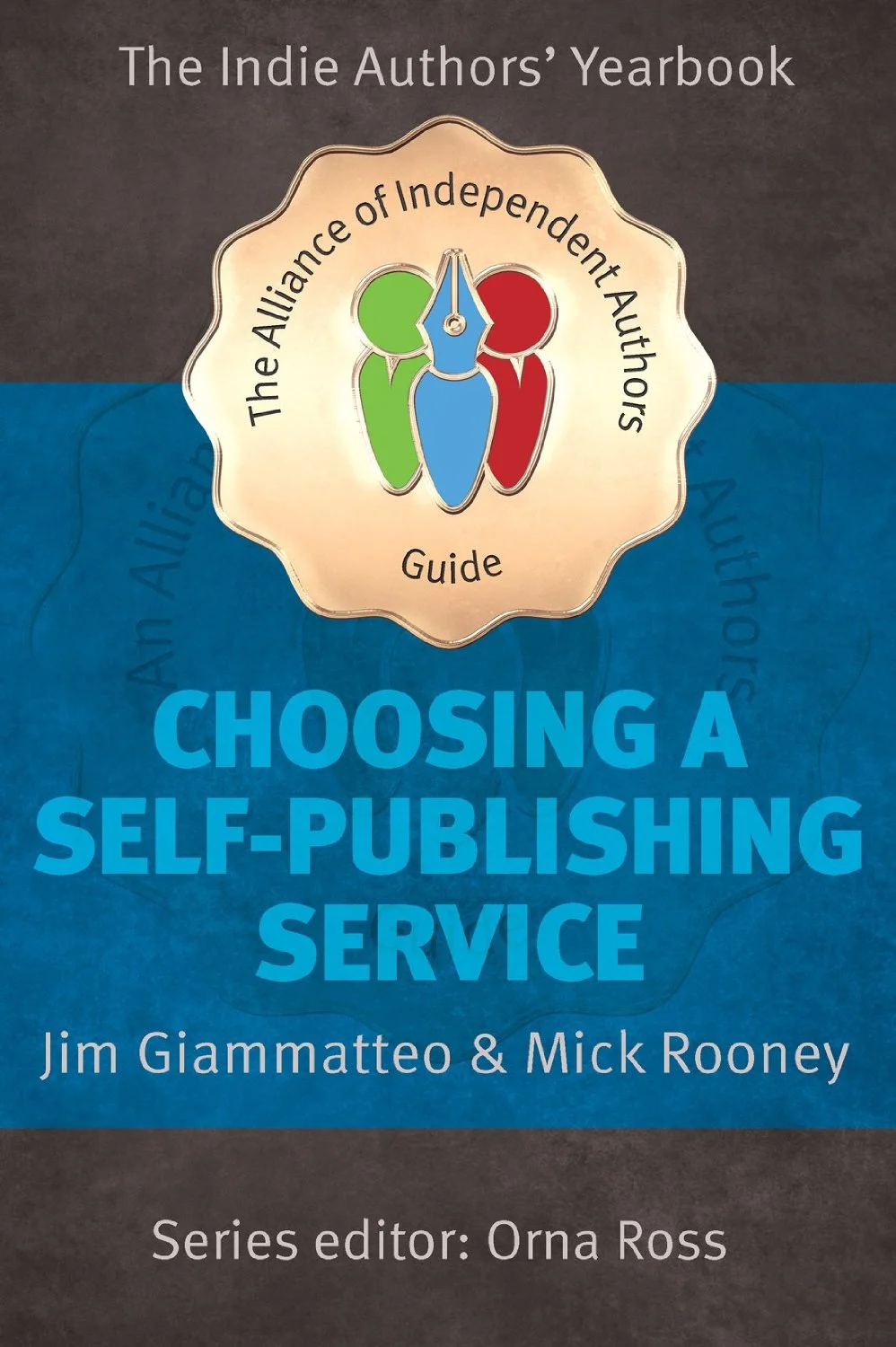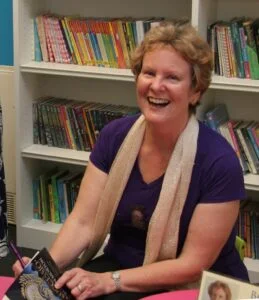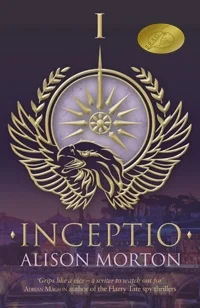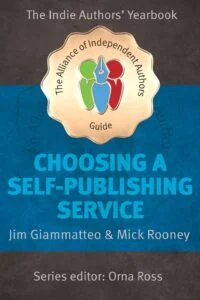As a counterpoint to US indie novelist Kathryn Guare's thoughtful post before Christmas explaining why she moved from assisted publishing to DIY, English thriller writer Alison Morton explains why she's sticking with the full-service option, even though she has the technical know-how to do it all herself if she wanted to.
Self-publishing and being an indie authoris a state of mind, not a statement of technical abilities. The decision to take control and exercise the freedom this publishing route offers is sometimes made in the blink of an eye; it fits the temperament, philosophy and pocket of many. Others, like me came along a slower route.
I’m a mixture of impulse and prudence, decisive yet a long-term planner.
I’m also old enough to know what my core, secondary and tertiary competences are.
I learnt the basics of touch-typing as a young graduate civil servant; all high-flyers had to do a two-week course, much to the disgust of the male graduates! And I have never stopped using this skill from manual typewriters, golfball electronic through to my Mac keyboard.
A Writer of Many Parts
In the interim, I’ve been a policy drafter, underwriter, translator, editor, image editor, project manager, executive search consultant, reserve army officer and run my own translation company for 20 years so I have the business, technical, HR and language skills for being an author entrepreneur.
So, with 90K of my first novel Inceptio written and polished into shape, decision made to self-publish with the support of a research project that would not disgrace the UN, I considered the options.
Considering the Assisted Publishing Options
First, whilst I admired the fiery independence of full-on DIY publishers, I knew I was not amongst them. I’m long-term computer literate; I started on a Viglen+ in 1989 and had one of the first websites in Kent, England. Driving a computer on DOS commands really enhanced my memory and patience. I’d completed countless accredited courses and used a computer most of my working day; I was perfectly able to learn all this stuff. In 2012, I self-published a history book (a reworked version of my masters’ dissertation) with 200 academic references, aka hyperlinks, via KDP. I could do it. (I did it again in 2014 with my little writing book The 500 Word Writing Buddy.)
Indie Horses for Indie Courses
But my first Roma Nova novel, Inceptio, was a different game; it had to be perfect. I’m with Adam Smith on division of labour; I did not want to spend my time learning a whole new skillset which may or may not be up to the highest possible industry standards when others, professionals, could do it for me. All I wanted to do was write. Well, I knew that whatever route I chose, I would also need to spend a significant chunk of time on promotion both before and after launch.
I researched designers, editors, formatters, ISBN providers, registrations, both individual services and full-service providers. It was then I came across Mick Rooney of The Independent Publishing Magazine, who gave me some excellent advice, and of course, ALLi. I weighed up all the information, advice and research and decided I wanted a complete package: a single point of contact, a coordinated service and one which had the expertise and knowledge of the publishing industry.
Shooting Down the Cowboys
Oh, boy, were there a lot of cowboys out there! Vanity and subsidy ‘publishers’ hovered, ready to pick the dosh from enthusiastic but innocent writers’ hands; garage-loads of books of varying quality produced at horrendous prices, and writers’ rights stripped away from them for all time. Rights are extremely important and often not given the attention they need, as I discussed on my blog here.
However, my research and analysis system sifted out the undesirables pretty quickly and left me with three serious contenders with long track records. I grilled each of them during a two-hour phone call and scrutinised their contractual arrangements. One stood out well above the others: ethical, book-oriented, realistic as well as happy to answer all my intrusive questions in a professional and business-like way. The key thing to bear in mind is that you are the client in the same way as when you engage a lawyer or accountant. And, like any professional service, you pay the bill.
Getting My Money's Worth
Now, what do I gain from using in a full-service provider? Why should I pay a fee and what do I get back?
On the practical side, I send them a copy-edited MS Word file which they turn into a beautiful paperback and ebook: formatting/typesetting and interior design, compilation of front and back matter, bespoke cover to my specification, all filing/registration fees, ISBN allocation, Nielsen Enhanced listing, pre-order and look inside on Amazon, PDF ARC, proofs, POD set up, digital archive fee, ebook formatting for different retailers, legal deposit, bookseller information sheet, print ordering, quality control checks and project management
Also, a lot of advice, handholding and 24-hour or less response, an author book promotion toolbox, author community and events, plus links into the publishing industry, e.g. representation/exhibiting at the London Book Fair.

Alison Morton lines up with fellow authors and guest speakers at the SilverWood Books open day – plenty of ALLi faces to spot there too!
Apart from the confidence of having a competent services provider, I also gain time – time to write. I’m sure this is one reason why I've been able to turn out a substantial series of top quality, full-length books in a relatively short space of time is due to contracting a publishing services provider to do the production work for me.
In my opinion, there is no one way better than any other. ALLi is there to offer information, especially via its guides – take advantage of them!
Whether you go DIY, buy in services on an ‘as and when’ basis or buy a full-service package, the choice really is yours. And isn’t that what independent publishing is all about?
FREE ADVICE ON HOW TO MAKE YOUR CHOICE
Alison Morton's account relates to her experience with SilverWood Books, after conducting her own meticulous research into the available suppliers. ALLi's guidebook Choosing a Self-Publishing Service cuts to the chase and provides an invaluable analysis of the services offered by the most popular providers, as well as a detailed guide on how to make your decision. The guidebook is free to ALLi members (one of many benefits of belonging to our organisation) and may be purchased by non-members – here are the buying links.
OVER TO YOU
What has your experience been of using assisted publishing services? Do you have any top tips to share with other authors considering that route? Please share via the comments box!
EASY TWEET
Why I chose assisted publishing for my #selfpub novels by @alison_morton #AuthorALLi #SilverWoodBooks Share on X
www.alison-morton.com








[…] Why I Don’t DIY Self-publish by Alison Morton […]
Jumping in Before Understanding the Business Side to the Business
I see a lot of writers rushing into self-publishing without properly preparing to be a small business, yet that is exactly what we are. When we self-publish, we take on new roles and we need to understand them. We need to be willing to fork out money for proper editing, cover design and formatting.
One of the benefits to traditional publishing is they take on all the risk and do the editing, proofing, etc. When we go it alone, we need to prepare for some expenses and do our research. We can be told a million times to not judge a book by its cover, yet that is exactly what readers do. Additionally, we may need to look into becoming an LLC. We need to set up proper accounting procedures and withhold the correct amount of taxes, unemployment, state taxes and on and on.
Indeed, you have to be professional on all sides of the job. As a former proprietor of a small business, that was familiar ground for me. But it’s the part of the job you ignore at your peril!.
The problem with the ease of self-publishing is that it is, well, too easy. When we are new, frankly, most of us are too dumb to know what we don’t know. Just because we made As in English, does not automatically qualify us to write a work spanning 60,000-100,000 words. I cannot count how many writers I’ve met who refuse to read fiction, refuse to read craft books, and who only go to pitch agents when they attend conferences at the expense of attending the craft sessions.
Additionally, too many new writers I meet do not properly understand the antagonist. They don’t grasp three-act structure, and most don’t have any idea what I mean when I mention POV, Jungian archetypes, or the phrase, “scene and sequel.”
I’m firmly in the camp of ‘learning your trade’, Janet. I regard 2009 to 2012 as my three-year apprenticeship. INCEPTIO, my first book went through the Romantic Novelists’ Association New Writers’ Scheme in two incarnations, I attended their conferences packed with craft and book industry sessions, the Festival of Writing at York, an Arvon Foundation course on commercial fiction, plus read countless craft books; that was in 2010/2011 alone.
Although I’ve now switched to the ‘speaking at’ side of the counter, I regularly attend conferences, classes, courses and workshops – you never stop learning. And the richness of experience and knowledge accessible via the Internet is breathtaking.
In the end, the readers will suss you out. If you write a structureless story with cardboard characters and sloppy research, they’ll devour you as if they were a pack of starving wolves.
Before I continue reading, I with to point out that when using abbreviations (such as DIY), there should be the completely spelled out version, within parenthesis, and to the left of the first occurrence of the abbreviated version in the text. For example, DIY (do it yourself). This, I say, because I had to consult a dictionary for the meaning of DIY. I admit that I’ve never heard of this term before.Sorry if I offended or embarrassed anyone. Besides, I feel that it’s too small an oversight to feel this way about it.
[…] her through the more technical aspects of self-publishing this week in ALLi’s Self-Publishing blog. Though she had the background to go it on her own – Morton self-published a nonfiction book in […]
The blog was most helpful. Two questions: Will SilverWood work just as well for a book in the US where I am? Do I need to invest in my own cover design? You seem satisfied with what SW produced. Thanks for your reply.
Hi again Robert,
SilverWood has clients all over the world; UK, Dubai, Australia, Sweden, Switzerland, France and these are the ones I can remember off the top of my head.
In the package of services I use, the covers are bespoke, and are included, so I haven’t needed to go anywhere else. And I *love* what they’ve done. Some authors already have their own branded artwork and SilverWood are happy to use that.
When choosing any service, it’s very important to go and look at what they’ve done for other authors. Browse their website and their own bookshop and you’ll get a flavour of their artwork capabilities.
For those of us who will not DIY, It would be helpful to know the identity of recommended self-publishing entities.
Robert, ALLI has produced a regularly updated guidebook called “Choosing a Self-Publishing Service”, which is an invaluable list of do’s and don’ts, and also profiles recommended suppliers. It’s not an exhaustive list, but it is a fabulous starting point. I’ll add a footnote to Alison’s post about this. Ed.
Hi Robert,
The ALLi Guide Debbie mentions will give you a great deal of excellent advice.
More info about my personal publishing journey is on my blogsite, particularly here:
http://alison-morton.com/2013/02/10/a-gallop-through-my-publishing-journey/
Much depends on the contract to which you agree. Some “assisted self publishing” services truly are. Others are basically “pay to publish”. Most of the latter are TERRIBLE for the writer.
To explain:
In order to self publish, the WRITER must be the publisher. This is, in the publishing industry, generally defined by the person or company who owns the ISBN. These days, with many books released without an ISBN, or with free ISBNs (but still completely under the author’s control) that’s not a very solid metric. What the ISBN used to indicate was CONTROL. Therefore, the issue remains *control*.
If you sign a contract which gives some other company the right to publish your work, which they then upload to THEIR accounts at retailers, distributors, and printers, then you have BEEN PUBLISHED. You have not published yourself. There’s nothing wrong with having someone else publish you.
But if you signed a document giving someone else the right to publish your work for you, then it’s pretty clear they are the publisher, not you. 😉 If you paid for the privilege, then you have paid-to-publish.
True assisted self publishing works differently. You pay a company, service, or person a one time fee. They do work for you (editing, covers, layout, whatever), hand you the finished product, which you have purchased the rights to. And then you upload it to your accounts (or heck, hire staff to upload it for you – that’s still self publishing, because the work remains in your accounts under your direct control).
Again, there’s nothing wrong with being published by some company. If you got a good deal, there isn’t even anything inherently wrong in the pay-to-publish model (although most of these, like the Author Solutions scams, are disasters for writers). But know what you’re doing. Know what rights you are signing away, AND for how long. Some of these companies take rights to publish for duration of copyright – so you never get all your rights back.
And stop calling it self publishing. Because if you are not the publisher, you didn’t self publish.
Fascinating reading – thank you for sharing this. I’ve done my books myself, but buying in editing and cover design, and it is a monumental pain fiddling around with it all, and loses writing time. Especially when you decide to make all of your e-book only books into POD versions at the same time. I’ve been told my product works and looks well, so I’m still in two minds as to whether to commit to the expense – maybe a test run for the next one is in order!
It really is a personal choice, Liz, and the cost shouldn’t be underestimated. I see using this route as an investment in my work. Thus, I owe it to myself to make the writing the best possible before it goes to production – a sort of self-imposed quality machine!
After two years, I have now broken even, so I’m into the clear profit era with the first three books in the Roma Nova series. I order as many or few print copies as I want (obviously that’s a cost), but I have worked out a reasonable profit margin for these.
Now, I’ve just send the fourth book off on this journey. You can guess my satisfaction level…
What a lovely account Alison. I’m in awe of people who can do all the self publishing things and truly do DIY, but I don’t know what half of the terms you mention are. Even if I come to learn the terms I certainly don’t want to learn the ‘how’. Actually that’s a benefit I’d cite from being an Alli member, you’ve all opened my eyes and made me so pleased that I chose assisted publishing.
However, I feel like an indie and I’m enjoying the slow build of an author platform – another term I didn’t know this time last year! X
Sorry, Yvonne, I didn’t mean to bamboozle anybody. Feel free to ask me to explain!
Yes, choice is the key.
Hi Yvonne, you make a good point there – it’s easy for those of us who have been in the business of self-publishing for a while to forget that some of the jargon may be puzzling to those who are earlier in the process. If you’d like to let me know which words you find unclear, I’ll plan a jargon-busting blog post that will explain the key terms, which I’m sure would be a really useful resource long-term. The tricky thing is that different people have different definitions of what the terms mean, but I’ll add a not about that too, and I’m sure people will offer their own definitions via the comments section too! Thanks for flagging that up. Ed.
Hi Alison,
Thanks for this! Amid the charge of DIY, I’ll stick my neck out again. 🙂
I chose a publishing service for my first book. I wanted my first book out there in the fiction genre to be professional and I did not want to spend months if not a year to hold me back from getting out there. I was a real newbie to self publishing at the time (still am) and I didn’t want to take the time to learn and I surely didn’t want to appear non-professional–the book or me. There has been pros and cons to this current process. One pro is that I’ve been able to learn from ALLi as my book is being handled by others. I knew what to expect and what to look for each step along the way (thanks to ALLi) and have begun to prepare to launch on my own if I choose to do so in the future. I have a lot of options for my second book and also for my non-fiction writing on fine art instruction. Both are somewhat overwhelming too. It’s all a learning process. I personally like a team effort. I’m happy to hear from editors, designers, etc who like a team player approach too. 😉
As for Mick Rooney–well, just can’t say enough great things about his unbiased advice and defense for all authors to find their own path along the self publishing journey. I’ll never forget his personal message to me when first joining ALLi–Thanks Mick ;-). Thanks to you and to Mick for all you do. Hopefully others who have chosen this route will feel confident enough to comment here as well. Thanks to Debbie, Orna and others for seeking out Alison to speak about this route in the self publishing arena.
Best,
Linda
I kept nodding my head and saying ‘agree’ as I read your thoughtful comment, Linda. Being a member of ALLi means I have learnt such a lot about publishing on your own account. I manage all my ebook accounts and can do promos and change prices, etc. but I have professional production back up to guarantee quality.
ALLi members have individual needs and make different choices. I’m so thrilled we share the same end objective of managing our own careers.
Thanks Alison. I so appreciate you. Hope we can get to know each other a bit more. Have a great day!
Thank you, Linda. You know we talk a lot about approaches, strategies, etc., when it comes to self-publishing – whatever the path, but the most important thing any author needs is encouragement.
Certainly Assisted Self-publishers have their place and can be very helpful – as yours is. .The difficulty lies in discerning which ones can be trusted. Most cannot. And it is extremely difficult for the uninitiated to be able to separate the good from the bad, especially when the same parent company keeps creating new names as subsidiaries. So many, (legions) have been duped by these scammers. I wonder what we, as authors can do, to help others find the best fit for their books without being taken in. At the same time it is unfortunate the the honest ones are being painted with the same brush as the dishonest ones.